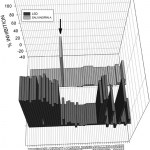neuroscience
RethinkingAutism.com is the brainchild of Dana Commandatore, a friend of one of my high school classmates. Dana is a former NYC advertising guru and the mother of Michaelangelo, a child with autism. His story inspired her to write the children's book, Michaelangelo the Diver.
Dana has now taken her creativity and contacts in her new home of Los Angeles to produce a series of controversial public service announcements to combat misinformation about the causes and treatment of autism and the acceptance and celebration of neurodiversity. Here is the spirit in which they are presented:
All too…
For more video book reviews by Joanne Manaster, see her page on YouTube.
If you read my February piece for the SEED website on art, science, and synesthesia, you'll remember Christopher Reiger's intriguingly ambiguous painting Synesthesia #1. I'm very pleased to report that it is now available as a limited edition print. I'd also like to call attention to Christopher's unusual sales model - what he calls his "charitable sales model:"
In the fall of 2008, I decided to contribute a significant percentage of every art sale to non-profit organizations that are working to redress environmental and social ails. By generating money for important causes through the sale…
This is one of those "interesting, wonder if it'll ever pan out"
studies. So far it has been presented at a meeting, but not
published. The study was summarized in an article on
Medpage Today (free registration):
href="http://www.medpagetoday.com/MeetingCoverage/APSS/14689#ayk">APSS:
Depression and Insomnia May Be Genetically Linked
SEATTLE, June 12 -- Insomnia and mood disorders may share a
common genetic pathway, which could explain both depression and
wakefulness observed in teens, researchers here said.
In a study of more than 1,400 twin pairs, about a third of…
MEMORY, Blake wrote, enables us to "traverse times and spaces far remote". It constitutes mental time travel, with which we can recollect, in vivid detail, events that took place many years ago. We have known, for the best part of a century, that memory is reconstructive rather than reproductive. That is, recollection involves piecing together specific details of the event, and mixing these with our own biases and beliefs. While not being completely accurate, our memories are, in most cases, reliable enough.
It is because of the reconstructive nature of memory that we are able to travel…
Salvia divinorum (Salvia, Magic Mint) is a plant used for entheogenic purposes by the Mazatec people of Mexico. A relative of the common garden plant "scarlet sage" (Salvia splendens), S. divinorum contains several hallucinogens that include salvinorin A, the first non-nitrogenous agonist known for kappa opioid receptors (KOR).
I had known of salvinorin A since a highly-cited 2002 Proceedings of the National Academy of Sciences paper by Bryan Roth, Richard Rothman and colleagues (full text here). At that time, I had read several anecdotal reports (that I cannot locate now) that the…
The German chemist Friedrich Kekule claimed to have intuited the chemical structure of the benzene ring after falling asleep in his chair and dreaming of an ouroboros (a serpent biting its own tail). He's certainly not the only person to have discovered a flash insight after waking from a good sleep. In science alone, many breakthroughs were apparently borne of a decent snooze, including Mendeleyev's creation of the Periodic Table and Loewi's experiments on the transmission of nervous signals through chemical messengers.
Most of us have tried sleeping on a difficult problem before and using…
And it is good. Much longer than #1 and interesting to all of us who have kids heavily involved in playing computer games:
Whenever kids are involved in a violent crime, speculation about their upbringing inevitably takes center stage. Were they abused or neglected? Could their parents have prevented the tragedy? Most recently, video games have been targeted as the possible root of the problem. But are video games really to blame for horrific massacres like the shootings at Columbine and Virginia Tech? This month's report considers the growing role video games play in our kids' lives--and…
It will not take more than a couple of minutes. Just go to this Sheril's post and follow the directions. She will use the results of the quiz to inform experimental design for an interesting project on the neuroscience of kissing. This will then be included in her next book.
People who place an emphasis on positive things and are generally optimistic are sometimes said to "see the world through rose-tinted glasses". According to a new study by Canadian researchers, this is more than just an idiom. The study, which has just been published in the Journal of Neuroscience, provides the first direct evidence that the mood we are in affects the way we see things by modulating the activity of the visual cortex. Their findings show that putting on the proverbial rose-tinted glasses of a good mood is not so much about colour, but about the broadness of the view.
A number…
Some may recall Brodmann
Area 25
(a part of the brain also known as the subgenual area or area
subgenualis). It was mentioned by Orli Van Mourik (
id="a028464"
href="http://scienceblogs.com/neurontic/2006/08/much_ado_about_area_25.php">Much
Ado About Area 25) in 2006, and by me in 2008 (
href="http://scienceblogs.com/corpuscallosum/2008/09/update_on_deep_brain_stimulati.php">Update
on Deep Brain Stimulation). David Dobbs profiled one of the
key researchers, Helen Mayberg, (
href="http://scienceblogs.com/smoothpebbles/2006/08/neurologist_helen_mayberg_in_s.php">Neurologist…
When one thinks of a heroin user, thoughts most often come to mind of a person living in squalor in a big metropolitan city or that of an artsy, poetic hipster (while there are many literary works on the life of heroin users, my all-time favorite is Basketball Diaries, an autobiographical account written by Jim Carroll during the ages of 12 to 15. From this description of Carroll's two works on his life with heroin at the catholicboy.com website of Carroll scholar, Dr Cassie Carter: "After reading about 30 pages of the Diaries, [Jack] Kerouac stated that 'at the age of 13, Jim Carroll writes…
I finally got around to reading my backed-up RSS feeds, and had the chance to peruse these, well, demented 1970s biology textbook illustrations uncovered by Crooked Timber. I mean, what? No - what??! Crooked Timber calls it a "Groovy Prog Rock Wannabe Biology Text." I don't know what to say, except that I went to Artomatic yesterday, which had something like a thousand artists, and this psychedelica is far trippier than anything I saw there. Whoa, man.
For the record, if I had, as a child, learned to associate biology with angry disembodied leopard heads flying towards me on Frisbees of fire…
In the June Atlantic Monthly, Joshua Wolf Shenk has a long, moving article about what may be the longitudinal study of all longitudinal studies - the Harvard Study of Adult Development (Grant Study), begun in 1937. Its creator Arlie Beck planned to track 268 "healthy, well-adjusted" men from their sophomore year at Harvard through careers, marriage, families, retirement and eventually death - and somehow, from this glut of longitudinal data, to glean the secrets of "successful living."
But the portrait Shenk paints is as full of pathos as it is of success.
Delving into the case files, now…
What did you do on March 13th, 1985? People with hyperthymesia (which has been characterized only recently, and of which just a handful of cases have so far been reported) would likely provide a vivid account of what happened on that day. And if this particular date has personal significance for you - if, for example, it was your wedding day, or the birth date of one of your children - then you will probably remember it quite well. But for most of us, the answer to this question is likely to be "I don't know".
In the journal Cortex, researchers describe the case of a patient with severe…
The Neurocritic points me to a paper, The brain structural disposition to social interaction:
Social reward dependence (RD) in humans is a stable pattern of attitudes and behaviour hypothesized to represent a favourable disposition towards social relationships and attachment as a personality dimension. It has been theorized that this long-term disposition to openness is linked to the capacity to process primary reward. Using brain structure measures from magnetic resonance imaging, and a measure of RD from Cloninger's temperament and character inventory, a self-reported questionnaire, in 41…
A few years ago I commented a fair amount on the topic of prosopagnosia, face blindness. Turns out that ~2% of the population can't really recognize faces, and this is a cryptic trait as many of these individuals have developed compensatory tendencies so that people don't know. Not only that, but there seems to be a strong genetic component so that it runs in families. At the time I was fascinated by this because it made me wonder at how much more "cryptic" variation there could be in the human population. It seems that face recognition is such a basic and universal "competency" that it is…
Although I saw this obituary over the weekend, I didn't get to posting it until today. I was reminded by a local friend, an outstanding young scientist in her own right, of the impact that Dr Schanberg had made on so, so many lives in science, medicine, and our larger community.
I only had the honor of meeting Dr Schanberg once, shortly after his cancer diagnosis, while we were at a Duke Cancer Patient Support Center fundraising dinner. His wife of over 50 years, Rachel, is founder and former director of the organization which they started following the loss of their own daughter.
Among…
The ability to interpret other peoples' emotions is vital for social interactions. We recognize emotions in others by observing their body language and facial expressions. The voice also betrays one's emotional state: words spoken in anger have a different rhythm, stress and intonation than those uttered with a sense of joy or relief. But how the emotional content of a voice is encoded in the brain was unclear.
Now though, Swiss researchers report that they have decoded the neural activity in the voice-sensitive regions of the brain, and demonstrate that this activity can be analyzed to…
When I found out a while back that Jonah Lehrer's next book was titled How We Decide, I knew I was going to check it out. It's no coincidence that I recently reviewed Predictably Irrational, I blog because I'm interested in reducing the human animal down its basic units of organization. Due to my disciplinary focus I generally touch upon behavior genetics or the inferences of human history one can glean from evolutionary genetics. History, psychology and economics are all domains which have piqued my interest. But I'll be honest and admit that I tend to avoid neuroscience because there's a…


